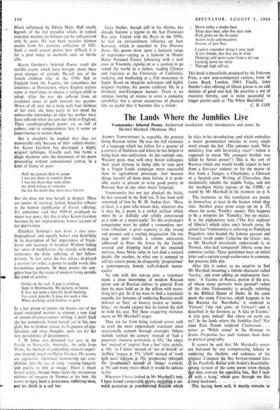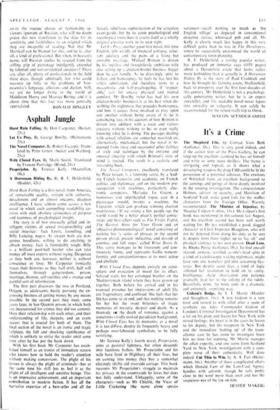The Lands Where the Jumblies Liye
ANDREY VOZNESENSKY is, arguably, the greatest living Russian writer. He uses the full resources of a language which lay fallow for a quarter of a century of Stalinism and which he has helped to bring back into cultivation. As this reminds one, Western poets may well envy Soviet colleagues their good fortune in being able to take part in a Virgin Lands campaign more successful than its agricultural prototype. Just because things haven't all been done before, it is prob- ably easier at present to write good poetry in Russian than in any other major language.
Voznesensky has not just plucked the fruits, he has sweated in the field too. It has been well remarked of him by W. H. Auden that: 'Here, at least, is a poet who knows that, whatever else it may be, a poem is a verbal artifact which must be as skilfully and solidly constructed as a table or a motor-cycle.' To this craftsman's competence must be added a tremendous ner- vous vibration; a great capacity to dip, swoop and pounce; and a soaring imagination. On one page our poet retails a solemn adjuration addressed to Peter the Great by the freshly severed and dripping head of his executed mistress Anna Mons (who in fact died a natural death). On another, in what one is tempted to call his sexiest poem, he eloquently 'propositions' a contemporary female wall-of-death motor- cyclist.
To ride with this ton-up poet, a translator needs a close knowledge of modern Russian idiom and of Russian culture in general. Even then he must hold on to the pillion with-every- thing he's got. So if we were to find a translator capable, for instance, of rendering Russian nozhi (knives) as 'feet,' or korovy (cows) as 'motor- bikes,' we should suspect that he lacked the skill to hold his seat. Yet these staggering mistakes occur on Mr Marshall's pages.
They are far from being isolated errors such as even the most experienced translator must occasionally commit through oversight. Others include 'coshed the camera' instead of 'had a puncture' (kameru prokolola, p. 63); 'An angry bee' instead of 'angrier than a bee' (zley pchely, p. 68); 'as I delve' instead of 'out .of breath' or `puffing' (sopya, p. 37); 'climb' instead of 'wash VII tears' (stezygt, p. 35); 'prophesies' (misspelt for 'prophecie) instead of. !things' (veshchi, p.. 56) and many, more which it would be tedious to list.
...Wherever I have looked in. Mr. Marshall's text, thive. found cornparable-eirorsjacudizie a six- - , quotation in. transliterate4.Rpssum which he risks in his introduction, and which embodies a major grammatical mistake in every single word except the last. (The sentence reads 'May tnladshey brat ubil Sovietskoy vlastr —which is supposed to mean 'My youngest brother was killed by Soviet power!') This is the sort of Russian which one would hardly expect to hear from a first-year student; or for the matter of that from a Tungus, a Chuckchee, a Chuvash or a Spanish cow. Writing of Chuvashes, they incidentally inhabit the middle Volga, and not the 'northern Arctic regions of the USSR,' as stated by Mr Marshall in his footnote on p. 6.
The footnotes to this translation are poems in themselves, at least in the licence which they take. Another gross error crops up on p. 37, where the name 'Yemlka' occurs. This happens to be a misprint for 'Yemelka,' but no matter. It is the explanatory note (`The first explorer of Siberia') which takes one's breath away. In actual fact Voznesensky is referring to Yemelyan Pugachov, who headed the famous peasant aad Cossack revolt under Catherine the Great: not, as Mr Marshall mistakenly understands it, to Yermak, who had 'conquered' Siberia some two centuries earlier. These gentlemen have an initial letter and a certain rough exuberance in common, but precious little else.
After this it comes as no surprise to find Mr Marshall inventing a female character called `Saysky,' and even adding an explanatory foot- note: 'A Tsarina of Russia, patron of the arts, of whom many portraits were painted'—when all the time Voznesensky is actually referring to the Biblical Queen of Sheba. In the same poem the name Virsaviya, which happens to be the Russian for 'Beersheba,' is rendered as Wirtsavr (`the rich gems of Virtsavi') and is described in the footnote as 'A lake in Estonia.' A rich gem, indeed! But where on earth are we? In the lands where the Jumblies live? Not since Ezra Pound rendered Cimbrorum . . . minas as 'Welsh mines' in his Homage to Sextus Propertius has such violence been done to poetical geography.
It cannot be said that Mr Marshall's errors are balanced by any compensating felicity in rendering the rhythms and cadences of the original. Compare the flat, broken-winded lines of his Parabolic Ballad with Auden's beautifully- ,...,. ps rung version of the same poem (even though t t does contain the appalling line, 'But I took with a bang,' which goes through me like a' - rusty hacksaw)... . $ : -, •• . . • • - -. • • Th- is having, been -,said, it merely. remains to
await the routine chorus of fashionable re- viewers ignorant of Russian, who will no doubt praise this new translation to the skies for its sensitivity and faithfulness to an original which they are incapable of reading. Not that Mr Marshall can be blamed for this, and he is, after all, a kind of professional. But when, in heaven's name, will Russian studies be rescued from the stifling grip of patronage indulgently extended by talented and not-so-talented amateurs? There are, after all, plenty of professionals in the field these days, though admittedly few who could measure up fully to the problems of Voz- nesensky's language, allusions and diction. Still, we are no longer Jiving in the world of Middleton Murry and Maurice Baring, and it is about time that this fact was more generally






























 Previous page
Previous page